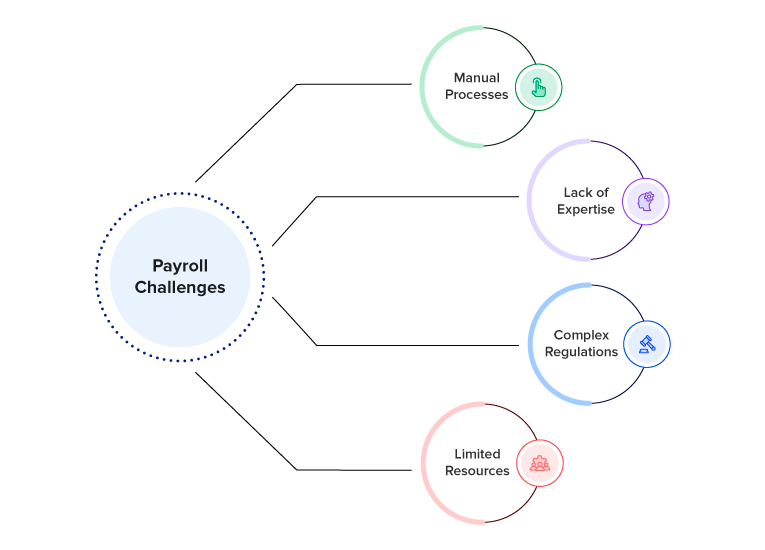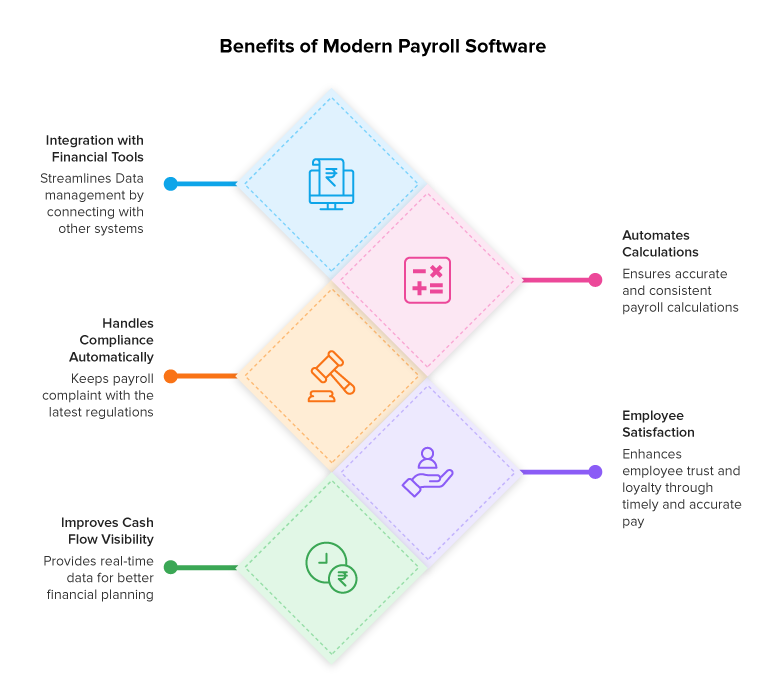Why Most Small Businesses Fail at Payroll – Easy Fix!

Table of Contents
When audited yearly, more than 30% of small businesses are fined in case of discrepancies due to payroll-related errors. Payroll might appear to be routine administrative work, but it is one of the most important operations of any business. Payroll accuracy involves ensuring employees are paid on time and adhering to evolving tax laws and statutory obligations.
One of the primary reasons small firms fail to manage payroll is due to manual procedures and legacy systems. Employing a spreadsheet or basic accounting tools can lead to mistakes, especially when managing intricate calculations like overtime pay, bonuses, and varying tax rates.
Smaller companies face issues with fewer financial and workforce assets. Without a solid grasp of payroll, business owners risk making mistakes like incorrect tax deductions, misclassifying employees, and overlooking filing deadlines, which can result in heavy fines. Here is why small businesses often fail in payroll management and how to fix it.

Why Small Businesses Fail at Payroll? (Major Reasons)
Payroll plays a crucial yet often overlooked role in small businesses. Many entrepreneurs are so busy trying to grow and manage their businesses that they often feel completely overwhelmed by the intricacies of payroll. When these details get overlooked, it can result in costly mistakes, fines for not following regulations, and even a drop in employee morale. It’s easy to see how important it is to keep payroll in check! The following are some of the most frequent reasons why small companies fail when it comes to payroll:

Lack of Payroll Expertise
More often than not, small business owners depend on various digital tools to process salaries. Even then, managing payroll can be complex without adequate training. When operators don’t have enough expertise, they often make unnecessary mistakes in tax calculations, benefit deductions, or record-keeping. This can create serious compliance issues down the line.
Complex Tax Regulations
Indian payroll is complicated due to all the different tax laws that update annually. A lack of proper understanding of these rules can lead to audits and financial penalties, such as underpaying or overpaying taxes.
Manual Payroll Processes
When payroll processing is done manually using spreadsheets, the risk of mismanagement is high, resulting in time-consuming and inappropriate document management.
Time-Consuming Payroll Management
Manually managing payroll requires a significant time investment for small companies with limited resources. Every payroll cycle demands careful attention, including monitoring employee work hours, complying with all tax regulations, and manually managing payroll, which results in tedious tasks and a higher chance of errors.
Missing Compliance Deadlines
Missing payroll compliance deadlines, like tax filings and provident fund submissions, can really hit small businesses hard. It’s easy to overlook these deadlines, but doing so can lead to hefty fines that can weigh down a small operation. It’s important to stay on top of these obligations to avoid unnecessary stress and financial strain.
Inability to Handle Changing Regulations
Regulatory requirements related to taxes, labor laws, and statutory compliance keep changing constantly. Small businesses are not equipped with a designated HR or legal team and mostly struggle to keep up with the laws. This incompetence sometimes results in non-compliance and operational disruptions.

What are the Consequences of Payroll Failures?
Incorrect or delayed payments may cause a financial burden on the employees and create anxiety and stress among them. Conversely, recurring payroll errors may be challenging for employers, too. If these errors continue, they may face heavy penalties from the Labor and Income Tax Departments. These penalties, over time, result in substantial financial losses. And, if such errors continue to occur, they can hurt the reputation of the company, so it becomes harder to recruit and retain good talent.
Legal and Compliance Risks
Payroll processing can be complex, mainly due to all the different labor and tax laws. These regulations keep updating annually and sometimes even biannually. Small businesses find it hard to stay up to date with the changing tax laws, leading to accounting errors. When financial records are not maintained well, it puts the company at risk during unexpected tax and labor inspections.
Administrative Burden
When payroll is processed manually, it raises the administrative burden and may impact the work-life balance of the employees managing it. Each payroll cycle involves several steps, including wage calculation, adjustments for leave and overtime, deductions, and the distribution of payslips. If done manually, each step can consume hours of time management. You can explore more about the challenges of manual payroll and why businesses are shifting toward automation.
High Employee Turnover Rate
When employees are not paid accurately or punctually, turnover rates rise. High employee turnover is one of the most common payroll challenges. Discrepancies in salary make employees lose confidence in the organization and destroy their relationship with their employers. This loss of trust causes the employees to slowly lose their productivity and eventually results in resignations.
Financial Penalties
Payroll mismanagement has a direct impact on a company’s finances through penalties. Labor departments and social security boards impose substantial fines on businesses for late submissions, incorrect tax filings, and violations of employment laws. These fines can affect a small business’s tight budget.

How Modern Payroll Software Fixes Payroll Failures in Small Businesses?

Automates Calculations
Payroll software that automatically calculates complex calculations accurately will decrease payroll mistakes. Automation in payroll ensures consistency in gross pay, tax deductions, and overtime calculations for every payroll cycle.
Handles Compliance Automatically
Today, payroll software automatically incorporates the latest regulations and updates to ensure payroll compliance. This automation allows businesses to pay their employees on time without worrying about managing all the different compliance laws. When the payroll is done right, it builds a sense of trust between the employee and the organization and enhances loyalty towards the company.
Employee Satisfaction
When employees receive their pay accurately and on time, they are more likely to be satisfied with the payroll system. Clear payroll processes foster a trustworthy and positive company culture. A self-service portal in payroll management allows every workforce member to access their payroll-related documents easily.
Improves Cash Flow Visibility
Good payroll systems help with financial planning by showing real-time payroll costs and liabilities data. Businesses can easily check upcoming pay and due taxes. This makes it easier to manage resources and avoid unexpected cash flow issues.
Integration with Financial Tools
Today’s payroll systems work well with accounting software, ERP, and HR platforms. This means all financial data can be managed in one place, which is really helpful. It will cut down duplicate data entry and avoid mistakes.

How to Choose the Right Payroll Software for Your Small Business?
The right payroll software is crucial for any business; it ensures compliance management, operational efficiency, and accuracy. Small businesses should choose the software that is easy to use and complies with local legal requirements. Here are some key factors to consider when selecting small business payroll software.
Ease of Use: Ensure that you choose payroll software with a user-friendly interface and that it is easy to set up. Pick software that everyone can manage, with or without payroll experience.
Compliance Features: Selecting the right payroll software that stays current with tax regulations and compliance management. Proper compliance management can help avoid penalties.
Automation Capabilities: A good payroll software should automate tax filing and all statutory calculations. Find software that is capable of doing so.
Integration Options: Payroll is not an independent process. For this reason, payroll software should easily integrate with HR functions that are necessary for calculating salaries, such as attendance, performance management, and time tracking.
Scalability: The goal of a small business is to grow. A solution that expands with the expanding business is ideal. It should accommodate additional employees, locations, and different pay structures as needed.
Support and Training: Any software can break down or have troubles, which would be challenging for small businesses to fix independently. Look out for effective customer support and access to training materials to help solve problems quickly.
Cost Effectiveness: Choose payroll software that offers the features required by the business within the company’s budget.

Final Words
Payroll is mostly associated with disbursing salaries, but it is so much more than that; business efficiency and satisfaction depend on it. Streamlining payroll for small businesses helps them avoid penalties and errors, but requires compliance at all costs.
A payroll software that is in sync with the other HR functions of the company is inadvertently more flexible and scalable in the long run. As the company grows, an intuitive payroll system makes sure that the internal operations are managed without a hitch. Such a system would build the company’s image as a professional and dependable workplace.
Why is Payroll Such a Common Problem for Small Businesses?
Many small businesses find handling payroll a real headache. They often struggle with tight budgets, do not have dedicated payroll experts on staff, and are confused by constantly shifting tax and labor laws. Owners might even handle payroll manually, which can lead to mistakes and compliance issues. Even small errors can result in penalties without proper payroll systems, which will ultimately waste time and effort.
How Can Payroll Software Help with Compliance Issues?
Payroll software makes compliance easier by automatically including new tax laws, government mandates, and labor regulations in payroll calculations. It also deducts accurate taxes, creates tax forms, and enables their timely filing to government agencies. This removes chances of errors from manual work and thus helps avoid penalties, notices, and legal hassles. So you can stay compliant without putting in too much effort.
How does factoHR Address Payroll Challenges for Small Businesses?
If any small business is looking for payroll software that complies with labor laws and generates accurate payroll reports, then factoHR is the right solution. Additionally, the platform connects with attendance, leave, and expense modules as a one-stop HR solution. By providing real-time updates on legal compliance, factoHR helps companies process payroll more effectively. Businesses can focus more on business challenges instead of HR and payroll issues.
Grow your business with factoHR today
Focus on the significant decision-making tasks, transfer all your common repetitive HR tasks to factoHR and see the things falling into their place.

© 2026 Copyright factoHR


